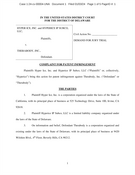-
The California Institute of Technology v. Dell Technologies Inc. et al DC
- 6:20-cv-01042
- W.D. Tex.
- Judge: Alan D. Albright
- Filed: 11/11/2020
- Closed: 05/14/2024
- Latest Docket Entry: 05/15/2024
- Docket updated daily
1
Plaintiff
2
Defendants
15
Accused
Products
4
Patents-in-Suit
1,281
Days in
Litigation
-
The California Institute of Technology v. Dell Technologies Inc. et al DC
- 6:20-cv-01042
- W.D. Tex.
- Judge: Alan D. Albright
- Filed: 11/11/2020
- Closed: 05/14/2024
- Latest Docket Entry: 05/15/2024
- Docket updated daily
Cause of Action
Infringement
Market Sector
Consumer Electronics and PCs
Court
Western District of Texas
Assigned Judge
Alan D. Albright
- Patent Information

